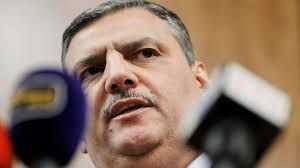US Secretary of State John Kerry is participating by video in the ministerial conference of the “hard core” of the Friends of Syria group in London, which is to support the political vision presented by the general coordinator of the opposition High Negotiations Committee (HNC), Riyad Hijab, in the research center this morning.
The political vision is composed of three stages: negotiations lasting six months between opposition and regime representatives, and a transition lasting 18 months “requiring the departure” of President Bashar al-Assad and including the formation of a transitional authority from opposition and government and major figures, and the formation of institutions including a military council, and ending with local, parliamentary and presidential elections, with the guarantee of “the continuity of the institutions of a united Syria.”
US Deputy Secretary of State Tony Blinken is representing Kerry in the ministerial conference at the British foreign ministry in the afternoon. After delivering a lecture at Chatham House, the Saudi Foreign Minister Adel Jubeir is participating in the Friends of Syria conference with his counterparts from Britain, Turkey, Qatar and Italy alongside European foreign affairs officials. The French Foreign Minister Jean-Marc Ayrault decided to participate to hold a bilateral meeting with Hijab, while deputy foreign ministers of Jordan, the UAE and Germany are representing their countries at the conference, which British Foreign Minister Boris Johnson called for.
Johnson, who had called for allying with President Assad in the war against ISIS after regime forces regained the city of Palmyra from the extremist organization months ago, began expressing the opinion of the current British institutions for the need to “form a representative government able to return stability and unity and the belief that President Assad remaining in Syria’s future will not lead to restoring its unity and stability.” A large number of British institutions have expressed this opinion as UK Prime Minister Theresa May has called for reviewing her country’s policy toward Syria.
On this basis, Johnson agreed after receiving the foreign affairs portfolio following Philip Hammond, to give a platform for the HNC to present its political vision as the outgoing Obama administration attempts to sign an agreement with Russia and between the new American President, to say that “there is a moderate opposition presenting to the Syrian people and the international community a rational political vision ready to negotiate with the government to form a transitional governing body guaranteeing the continuity of state institutions,” according to an informed source.
The HNC has worked on the formula of its vision for a political solution for a number of months and sent previous drafts to leaders of armed groups, political groups and activists in local councils in opposition areas before approving it in HNC meetings in Riyadh a few days ago. It sent the final draft, the executive summary and the document, to the foreign ministers of the Friends of Syria Group participating in the conference in London. There was an understanding that a delegation would be formed from the HNC which emerged from the opposition conference in Riyadh at the end of the year and that the delegation will include representatives of the opposition abroad, including the head of the Syrian National Coalition Anas al-Abdah, and in Syria, including the general coordinator of the National Coordination Body for Democratic Change, Hassan Abdel Azim, coming from Damascus, in addition to the head of the Southern Front of the Free Syrian Army, Abou Osama al-Jolani, and the head of the Suquor Jabal Zawiya group, Hassan Hajj Ali, from the northern front. The delegation will also include consultants and defected diplomats and journalists.
This morning Hijab presented to the Center for Strategic Studies the political vision and its current executive summary of the general principles for the future Syria and its secularity and territorial unity, in addition to the three stages of the political solution: the negotiating stage lasting six months, the transitional stage lasting 18 months, and the final stage for the future Syria.
Abdah said in a statement for the Coalition, that the vision “will present a clear path for a political transition in Syria, and no one who wants a just political solution could reject it.” Quoting the document, he said “there is no place for (President) Assad in the transitional stage nor in the future of Syria. We are committed and adhering to the fundamentals of the Syrian revolution. Based on these principles, we are presenting a clear route to a solution.”
Journalists presented questions on the extent of the relation between these documents with the reality on the ground, especially with the recent advance of the Syrian army and its imposition of a siege on the eastern districts of Aleppo, alongside Russian air support and Iranian ground support. People close to the HNC said there was a “development” in the document compared to its predecessors in that it was putting forward the position as a negotiating position and not a precondition with the readiness to enter negotiations to arrive at an acceptable settlement. The source said that the proposed solution was the formation of a transitional body with several institutions including a military council and a reconciliation committee and a transitional government and a reconstruction authority to provide conditions for national dialogue, as well as a new constitution, leading up to local and parliamentary and presidential elections at the end of the transitional stage after 18 months. He noted that the vision includes the “continuity of the institutions and stability of the country.”
This article was translated and edited by The Syrian Observer. Responsibility for the information and views set out in this article lies entirely with the author.


